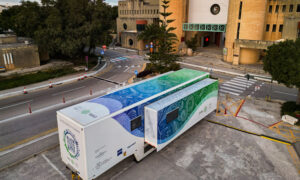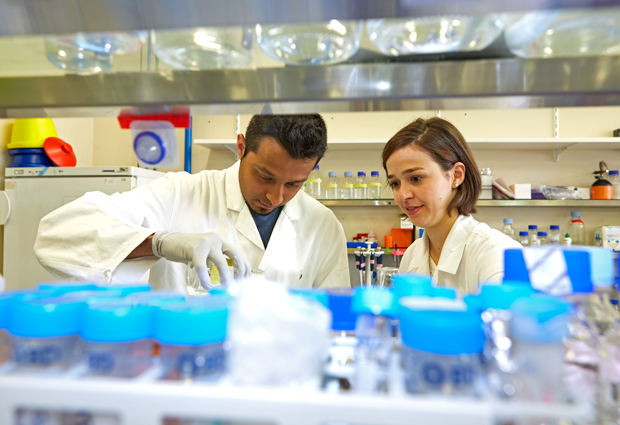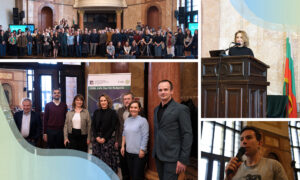
Strengthening links with Italian research community
EMBL strengthens links with the Italian scientific community as its Monterotondo site refocuses its research direction on neurobiology and epigenetics

EMBL has a history of creating strong links with institutions in its host countries. At EMBL’s Monterotondo site, links with the Italian research community are being strengthened as the Unit refocuses its research on the fields of neurobiology and epigenetics.
More specialised
“As a relatively small unit, EMBL’s Monterotondo site will benefit greatly from having a more specialised research focus, while leveraging its accrued expertise in technologies related to mouse biology,” says Phil Avner, head of the Unit. “By creating a centre of gravity for these topics in Monterotondo, EMBL will create a European centre of excellence for neurobiology and epigenetics.”
Complementing and connecting with expertise available across EMBL in cell biology, genomics, advanced imaging, transgenic animals, and big data analysis, EMBL’s Monterotondo site has the potential to make unique contributions in neurobiology and epigenetics.
EMBL will create a European centre of excellence for neurobiology and epigenetics
The local research ecosystem in Rome also provides potential for powerful collaborations. EMBL Monterotondo is looking to refresh its already substantial links with Italian research communities – around Rome and more broadly in Italy – particularly with institutes with complementary interests and expertise.
Joint retreats and exciting collaborations
EMBL has forged a number of close ties with Italian research institutions since the Monterotondo site was first established in 1999, including with the Institute of Cell Biology and Neurobiology of the Italian National Research Council (CNR), with which EMBL shares its campus.
During the past four years a particular effort has been made by scientists at EMBL Monterotondo to further develop mutually beneficial links with select Italian institutes. This has included a series of high-level meetings with the Italian Institute of Technology (IIT) in Genova whose activities in the fields of robotics, nanotechnology, microfluidics and brain research complement research taking place at EMBL.
EMBL Monterotondo is looking to refresh its already substantial links with Italian research communities – around Rome and more broadly in Italy
Promising areas for potential collaboration with IIT include the application of high-density electrode arrays to monitor thousands of neurons simultaneously in the brain of live animals and the development and in vivo testing of novel molecular sensors and switches. “Several collaborations have already resulted from our joint retreats and there is a lot of excitement on both sides,” explains Cornelius Gross, deputy head of EMBL’s Monterotondo site.
Links to other Italian institutions have focussed on epigenetics and cell biology. Teams from EMBL and the Institute of Molecular Oncology (IFOM), a leading Italian institution in cancer research, held an initial retreat in Milan in 2015 and links between IFOM and EMBL Monterotondo continue to develop. Kristina Havas-Cavalletti, a former postdoc in the Jechlinger Group at EMBL Monterotondo, was recently recruited as a group leader at IFOM.
Widening horizons for PhD students
Several initiatives aimed at young researchers have been organised together with Sapienza University, the largest public university in Rome. Phil Avner and Irene Bozzoni from Sapienza University organised a chromatin and epigenetics meeting for PhD students in September 2016, attracting more than 90 researchers for two days of lively discussions on the influence of DNA modification on cellular processes. Following the success of this meeting, a follow up is planned and will be open to students from other institutes across Rome.
Since 2014 EMBL has also been collaborating with Sapienza University’s Center for Research in Neurobiology (CRIN), hosting a special seminar series that invites outstanding international neurobiologists to the Sapienza campus. Now the series has been expanded to include speakers in both neurobiology and epigenetics.
Finally, to support collaboration in the area of PhD training, EMBL and Sapienza University recently signed an agreement for awarding joint PhD degrees to students enrolled in EMBL’s International PhD Programme. “Being jointly enrolled at Sapienza means PhD students based at EMBL’s Monterotondo site can now build close mentoring relationships with local experts in neurobiology and epigenetics,” says Gross.
More interdisciplinary postdocs
More recently, opportunities for collaborating with Italian institutions, in particular with the IIT, have been formally extended to postdoctoral fellows, with IIT becoming an academic partner of EMBL in the context of its interdisciplinary, interinstitutional and intersectorial postdoctoral programme, known as EI3POD. As of 2017 fellows recruited jointly by the two institutions will be able to carry out projects involving up to two groups from EMBL and one from IIT, with the chance of working for a period of up to nine months in Genova.
“We are particularly excited about bringing unique technology in nanofabrication from IIT to EMBL using the EI3POD mechanism,” says Paul Heppenstall, group leader at EMBL Monterotondo. EMBL and IIT are also planning a more targeted local joint postdoctoral programme, inspired by the success of a similar programme run by EMBL-EBI and the Wellcome Trust Sanger Institute.
“EMBL will benefit immensely from increasing collaborations and connections with top Italian research institutions with complementary, multidisciplinary strengths and interests central to our ongoing research refocussing,” Avner adds.


